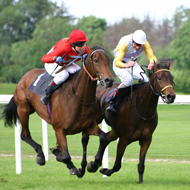
Horseracing Betting Levy Board invites applications
The Horseracing Betting Levy Board (HBLB) is inviting applications for veterinary research funding for next year.
Scientifically robust research projects which will benefit the health and well-being of horses, particularly thoroughbreds, or which will minimise the impact and improve the clinical management of disease and injury in all age groups, promote successful breeding and production, or prevent injury in racehorses, are all eligible for HBLB funding.
The HBLB publishes a comprehensive statement of the scope of HBLB’s veterinary research interests. The HBLB’s strategic research priorities are:
• Improved prevention of current and emerging infectious diseases by the development of more effective vaccines, diagnostic tools, biosecurity and management strategies;
• Improved training environment and racecourse design and surfaces, riding strategies, tack and equipment to enhance the safety, health and well-being of racehorses;
• Improved methods of identification, management and prevention of musculoskeletal disease and injury in Thoroughbreds;
• Improved male and female reproductive efficiency.
More than 450 research projects have been supported by the HBLB over the past 50 years. In the last 15 years, more than £16 million has been invested in projects primarily for the benefit of the racing or breeding of thoroughbreds, but which can often benefit other equines as well.
For further information on all HBLB-funded research, go to racehorsehealth.hblb.org.uk.
Details as to how to apply are available here.
Image by Softeis.



 The Federation of Independent Veterinary Practices (FIVP) has announced a third season of its podcast, Practice Matters.
The Federation of Independent Veterinary Practices (FIVP) has announced a third season of its podcast, Practice Matters.